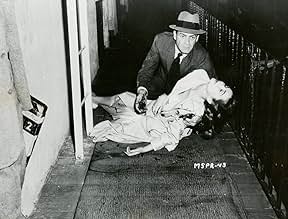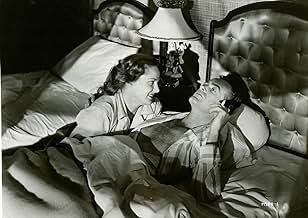In Arizona, a train's baggage car is robbed of a large payroll, prompting an investigation led by a railroad official-insurance investigator team.In Arizona, a train's baggage car is robbed of a large payroll, prompting an investigation led by a railroad official-insurance investigator team.In Arizona, a train's baggage car is robbed of a large payroll, prompting an investigation led by a railroad official-insurance investigator team.
Rodolfo Hoyos Jr.
- Lt. Castro
- (as Rudolpho Hoyos)
Robert Anderson
- Sheriff Jack of Winston
- (uncredited)
Raymond Bailey
- Sam Hendricks
- (uncredited)
Art Balinger
- Jail Officer
- (uncredited)
Howard Culver
- Pete the detective
- (uncredited)
Roy Glenn
- Train Porter
- (uncredited)
William Kendis
- Eddie, baggage handler
- (uncredited)
John Maxwell
- Train Conductor
- (uncredited)
Anna Navarro
- Mexican Bar Fly
- (uncredited)
- Director
- Writers
- All cast & crew
- Production, box office & more at IMDbPro
Featured reviews
This is a neat, no-frills thriller about an intricately planned train heist, the turbulent insurance investigator assigned to the case, and his hard-nosed boss whose motto is "There's no such thing as a perfect crime." Filmed in the flat, greyish TV style of the 50s with occasional expressionist touches, it is rife with plot twists and intriguing characters, and features a supporting cast of familiar faces (Alan Reed, Jack Klugman, etc). It should appeal to those who prefer story over stylishness. Tough-guy Stevens starred in several top-notch noirs of the 40s, and directed a couple of good second-feature thrillers in the 50s, including Cry Vengeance.
It's remarkable how many actors from the Golden Age of Hollywood began or ended their careers making crime pictures ( or horror movies). Mark Stevens is a case in point. He began promisingly enough with the stylish noir The Dark Corner in 1946 and basically ended it with Timetable ten years later. Was he a classic Marlowesque private eye in the first one, in Timetable the rigors of maintaining a Hollywood career have visibly and morally taken their toll. Directed by Stevens himself, all the glamour of the classic noir is drained from both the look of the film as from the protagonists. Stevens has the look of a man who has seen too much and has basically given up hope that his life will change for the better. Even his last desperate attempt to turn his life around seems doomed from the start. Which is not helped by the strict moral code of the day that is constantly underlined, namely that Crime Doesn't Pay. The plot is a little convoluted, but then that's not what we watch these movies for. Stylistically it has little going for it,and small effort was made to avoid a stage-bound look. But the performances are adequate enough and especially Stevens is totally convincing as the world-weary protagonist. For noir fans this one is certainly worth a look.
"Time Table" is a rather forgotten crime film which was directed by and stars Mark Stevens—a very capable but mostly forgotten actor from the 50s and 60s. It's really a shame the film isn't seen and lauded, as it's quite good—especially since it has a very modest budget. I've never seen it on TV nor DVD but fortunately it IS in the public domain and is therefore available through archive.org—a website often linked to films on IMDb. Download a free copy and watch it—it's quite good.
The film starts off wonderfully—with one of the most intelligently filmed heists I can remember. You really need to see it—and I don't want to spoil it by saying more about this. In the next scene, a couple are talking about their upcoming and much-needed vacation to Mexico when the phone rings—the husband (Stevens) is needed at once. It seems he's an investigator for the insurance company covering the heist—and they want him to look into it ASAP. This means the vacation is on hold.
When the investigation begins, it's quite obvious that the crime was very, very professional and was carried out with attention to every detail. However, during the robbery, somehow one of the gang was injured—and this might be the lead they need to break the case. But, in a WONDERFUL twist, the audience soon learns that there is so much more to the story than anyone has anticipated and the identity of the big brains of the operation is quite the surprise. I'd say more but don't want to spoil it.
Some might consider this film to be an example of Film Noir. Well, it is a crime film from the 1950s and is pretty unflinchingly violent in places. However, the film lacks the snappy dialog and cinematography you'd expect for Noir. I personally like the way the movie was handled, as it seemed more realistic than Noir—like you were watching a real investigation unfold. Fascinating throughout.
The film starts off wonderfully—with one of the most intelligently filmed heists I can remember. You really need to see it—and I don't want to spoil it by saying more about this. In the next scene, a couple are talking about their upcoming and much-needed vacation to Mexico when the phone rings—the husband (Stevens) is needed at once. It seems he's an investigator for the insurance company covering the heist—and they want him to look into it ASAP. This means the vacation is on hold.
When the investigation begins, it's quite obvious that the crime was very, very professional and was carried out with attention to every detail. However, during the robbery, somehow one of the gang was injured—and this might be the lead they need to break the case. But, in a WONDERFUL twist, the audience soon learns that there is so much more to the story than anyone has anticipated and the identity of the big brains of the operation is quite the surprise. I'd say more but don't want to spoil it.
Some might consider this film to be an example of Film Noir. Well, it is a crime film from the 1950s and is pretty unflinchingly violent in places. However, the film lacks the snappy dialog and cinematography you'd expect for Noir. I personally like the way the movie was handled, as it seemed more realistic than Noir—like you were watching a real investigation unfold. Fascinating throughout.
I seen many bad reviews for this film and I just do not get it. I love it, it may not be the greatest film ever made but I love it. It is cheesy and I am okay with that. If you watch it without being overly critical it is a fun watch. It has its twists and turns which keep you interested. The plot is pretty decent and for the time original. If you like this genre of film you should really enjoy this one. Mark Stevens does a credible job as the lead and it is the earliest film I believe I saw Jack Klugman in. Ignore the nay sayers and give it go it may not be the best film you have seen but it will keep you entertained and in the end that is all a film is supposed to do. Yes there are some issues with the film but it was not a big budget movie and they do a brilliant job with what they are given. Try it, you won't regret it.
This is a fast paced crime thriller involving a well synchronized heist of $500,000 from a train. Insurance investigator Charlie Norman (Stevens) and railroad detective Joe Armstrong (Calder) are called in to investigate the crime. The gang of thieves seem to have thought of everything and covered their tracks well. But then things start to unravel and the gang's leader kills one of gang members who is on the verge of telling all to the police. Armstrong is a dogged detective who pays attention to the smallest detail and whose motto is "There's no such thing as a perfect crime." That's certainly so in this case. Stevens does an okay job as Charlie Norman but he doesn't have a particularly striking screen presence and often delivers his lines too flatly. Even so, this movie has a couple of great twists and maintains interest throughout
Did you know
- TriviaThe $500,000 payroll stolen would be the equivalent of $4,400,000 in 2016.
- GoofsIn the robbery, Dr. Paul Brucker removes three small cash bags from the safe and puts them in his suitcase. But the heist was $500,000 in small bills. Even all new $20 bills wrapped and stacked together would make a pile more than nine feet high. With mixed used small bills ($5 to $20) that couldn't be traced, it would take a large suitcase to handle the money. And, it would weigh at least 60 pounds.
- Quotes
Joe Armstrong: There's no such thing as a perfect crime. Just a lucky one. But their luck will run out.
- ConnectionsFeatured in The World Famous Kid Detective (2014)
- How long is Time Table?Powered by Alexa
Details
- Release date
- Country of origin
- Official site
- Language
- Also known as
- Timetable
- Filming locations
- Production company
- See more company credits at IMDbPro
- Runtime1 hour 20 minutes
- Color
- Aspect ratio
- 1.37 : 1
Contribute to this page
Suggest an edit or add missing content





































